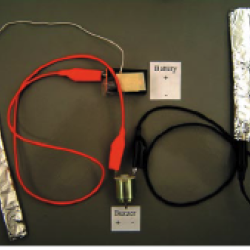Source Institutions
Source Institutions
Add to list Go to activity
Activity link broken? See if it's at the internet archive

In this activity, learners investigate the different salinity levels of oceans, rivers and estuaries. Learners then use experimentation to determine which sample is the best model of each type of natural water source. The first test, for conductivity, shows learners that a water sample with the right salinity can even be used to light a bulb or ring an electric buzzer. The second test, for evaporation, shows how rate of evaporation is affected by salinity level. This activity can be followed by Water Body Salinities II from the same resource. Includes background material.
- 10 to 30 minutes
- 1 to 7 days
- Over $20 per group of students
- Ages 8 - adult
- Activity, Lesson/Lesson Plan, Model
- English
Quick Guide
Materials List (per group of students)
- student journals and writing tools
- 3 1000-mL graduated cylinders or 2-liter soda bottle
- distilled water
- kosher salt
- balance
- roll of insulated wire
- wire stripping tool
- large state map
- NJ outline map (in student journal)
- colored pencils
- 1 cup opf water
- 3 16-oz cups
- 9-volt battery
- small light bulb or buzzer w2 insulated wires attached
- masking tape or alligator clips
- one 12-inch length of insulated wire (ends stripped)
- 2 popsicle or craft sticks
- aluminum foil
- 3 9-oz plastic cups
- permanent marker
Subjects
-
Earth and Space Science
-
Earth Structure
- Oceans and Water
-
Earth Structure
-
Life Sciences
-
Ecology
- Energy Flow and Chemical Cycles
-
Ecology
-
Physical Sciences
-
Electricity and Magnetism
- Electric Circuits
-
Chemistry
- Chemistry of Life
- Solutions
-
States of Matter
- Liquids
- Changes of Phase
-
Electricity and Magnetism
-
The Nature of Science
-
The Scientific Process
- Asking Questions
- Conducting Investigations
- Gathering Data
- Formulating Explanations
-
The Scientific Process
Audience
To use this activity, learners need to:
- see
- read
- touch
Learning styles supported:
- Involves teamwork and communication skills
- Involves hands-on or lab activities
Other
Components that are part of this resource:
Includes alignment to state and/or national standards:
This resource is part of:
Access Rights:
- Free access
By:
Source Collection
- Science After School Consumer's Guide
Rights:
- All rights reserved, State of New Jersey, 2006
Funding Source:
- No Child Left Behind Act of 2001
